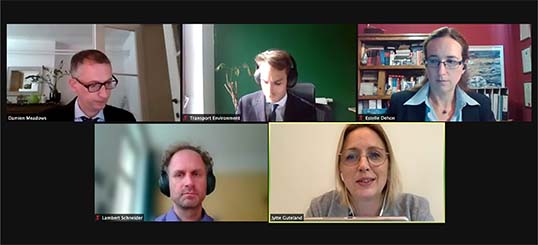International shipping and aviation are subject to the Paris Agreement, legal analysis concludes
18 October 2021

A legal analysis of the Paris Agreement has concluded that emissions from international shipping and aviation are both covered by the treaty.
Campaign group Transport & Environment (T&E) commissioned the legal analysis due to the fact that no state has included international shipping and aviation while setting reduction targets. The findings were presented on Wednesday 13 October 2021 through a webinar titled 'How to decarbonise international aviation and shipping?'
There has been confusion as to whether shipping and aviation emissions are within the scope of the Paris Agreement, as these emissions are released beyond national borders. The legal analysis presented at the webinar found that contrary to industry claims, shipping and aviation are included in the Paris Agreement.
The author of the legal analysis, Estelle Dehon of Cornerstone Barristers, approached the analysis by looking into the plain language of the Paris Agreement and what it says regarding shipping and aviation, within the context of UN Framework Convention on Climate Change and the Kyoto Protocol. Unlike the Kyoto Protocol, the focus of the Paris Agreement is a temperature goal. Parties are obligated to implement 'economy-wide absolute emission reduction targets,' to ensure that global warming is limited to well below 2 degrees celsius. A failure to address these emissions, including international shipping and aviation, would violate the central aim of the Agreement.
'The key thing as a lawyer that I'm always interested in, is to understand what the plain meaning, what the plain language of the international obligations is,' she said.
Her view of the Paris agreement is that shipping and aviation should be included in as nationally determined contributions (NDCs). The difference of opinion originates from the Kyoto approach which designated the responsibility to the International Maritime Organisation (IMO) and the International Civil Aviation Organisation (ICAO). Kyoto had become the default way to approach international shipping and aviation emissions.
Delegation to the ICAO and IMO was convenient, but they are not the only bodes with the ability to address shipping and aviation emissions, said Ms Dehon.
Based on this analysis T&E calls on states to revise their NDCs to take into account all their shipping and aviation emissions.
This view was echoed by Damien Meadows, a representative of DG Clima, who agreed with Ms Dehon's legal opinion saying that it is not difficult for countries to take responsibility, it is just inconvenient for them. He said that these reasons are largely political as to why certain countries and organisations would choose to ignore these protocols and noted the misreporting of the Paris Agreement in the media: 'It was less than a week ago, I read in Reuters again, that the Paris Agreement has left out aviation and shipping. I think we need a deeper examination of why this continues to be misreported in the media, because it's not what the treaty says.'
Mr Meadows also raised the lack of transparency on the reporting of emissions, as the EU publishes its documents together, yet he says he is yet to see countries like Saudi Arabia publish anything.
The topic of politics and how to overcome these political challenges and confusions around the Paris Agreement was put to the panel. MEP Jytte Guteland said the key to success is to get a new dynamic on how countries address these issues and work together. Ms Guteland said progressive nations and nations which are currently being affected and their leaders are fundamental to this. She referred to a minister from the Marshall Islands who told the IMO MEPC 2015 conference that for them meeting the goals of agreements like Paris is 'about survival,' and said that voices like this minister's will be louder.
Looking towards COP26, Ms Guteland was optimistic: 'At this moment we have more pledges for climate than we have ever had, and it is definitely a year of climate. Many political leaders are saying things that were not even reachable a couple of years back.
'On the other hand, there is a lack of action and we need to make sure that these words are concrete, and down to action plans in the different member states, in the UN system, and the European Union can act by example. We can show that we do it for real, that we implement the Paris Agreement and we do it with very concrete action for every sector – no one has an exemption. The maritime sector is definitely part of this. We cannot see any reason why these international sectors should fly under the radar.'
Estelle Dehon's legal analysis can be read in full on the Transport & Environment website.
Tags
More articles
Nautilus members eligible to join UK ocean science project for sustainable development
Nautilus International members are eligible to volunteer for the UK's National Decade Committee (UKNDC), which will work on the country's contribution to the United Nations Decade of Ocean Science for Sustainable Development.
Time for urgent action on alternative fuels, warns LISW decarbonisation seminar
The shipping industry needs to start pilot projects for alternative fuels right away if it is to stand any chance of meeting its decarbonisation targets, according to a London International Shipping Week event
Water Revolution Foundation seeks superyacht crew input into sustainable shipping
Superyacht crew can contribute their operational experience to the Water Revolution Foundation (WRF), an organisation seeking to be a central platform for the sector that can provide connections, tools, knowledge and best practice to improve the marine environment.
